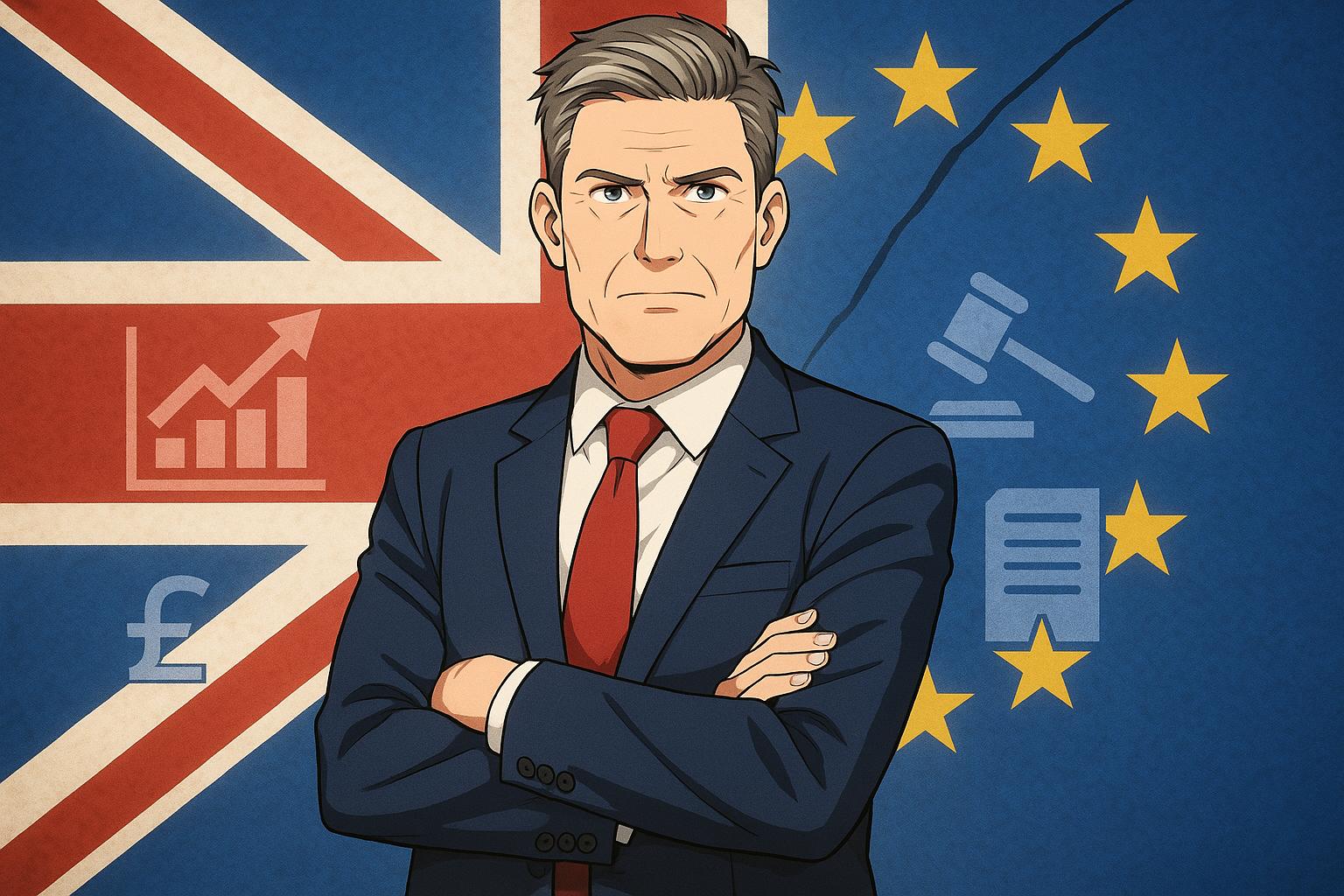Keir Starmer’s new agreement with the EU promises unprecedented access to the Single Market but faces sharp criticism over regulatory alignment, fisheries access, and loss of UK voting rights, reigniting fierce debates on sovereignty and Brexit’s future.
Keir Starmer's maneuvers to deepen trading links with the European Union have ignited heated debate within the UK political landscape, especially amid increasing concerns over significant barriers in the Single Market. In what he claimed was a transformative agreement, the Prime Minister touted "unprecedented access to the EU market," branding it the best deal any country outside the EU or EFTA could hope for. Starmer optimistically pointed to products like "great British burgers" and shellfish as shining examples of British exports poised to reclaim their EU foothold.
However, just days after the announcement, the European Commission unveiled documentation highlighting ten critical barriers affecting the Single Market, exposing the complexities that continue to plague trade post-Brexit. This revelation raises serious doubts about the credibility of Starmer's assertions; the glaring realities of regulatory alignment are difficult to ignore. Critics from various quarters, including prominent Conservative voices, have already denounced the agreement as a "sellout," noting its provision for dynamic alignment with EU regulations without any UK voting rights—a stark warning underscoring the struggle between cooperation and sovereignty.
Presented as a "reset" in UK-EU relations, the agreement emerged from a summit featuring Starmer and EU Commission President Ursula von der Leyen. It proposes notable elements beyond trade, such as mutual commitments to lift food export checks in exchange for adherence to EU food standards, effectively jeopardizing British autonomy in regulatory matters. Additionally, boosted defence collaboration and a new youth mobility scheme are featured, which many see as attempts to deepen ties with the EU at the expense of national interests.
But this strategy has faced sharp criticism. Detractors see the concessions regarding fisheries—where EU vessels are granted access to British waters for 12 years—as a significant betrayal of Brexit principles. Furthermore, many argue that this compromise obliterates previous assertions of the UK benefiting from genuine regulatory independence. The echoes of Brexit’s turbulent history resonate through these negotiations, signalling an ongoing struggle to redefine the UK's relationship with its European counterparts.
Despite these challenges, proponents of the deal tout possible economic benefits, claiming it could inject £9 billion annually into the UK economy by 2040. However, achieving this promised growth will require deft navigation of persistent trade frictions and unresolved regulatory adjustments. With approximately 46% of the UK’s trade still enveloped in deals with EU countries, the stakes surrounding these negotiations are alarmingly high.
As the UK seeks to move beyond the divisive legacy of Brexit, the implications of any emerging agreements will undoubtedly reignite discussions around sovereignty, regulation, and the practicalities of international cooperation. Whether the government can adequately maintain a balance between these competing interests is uncertain, and the ramifications of further integrations or partial withdrawals are poised to provoke renewed political discord and necessitate fresh negotiations.
Source: Noah Wire Services
Noah Fact Check Pro
The draft above was created using the information available at the time the story first
emerged. We’ve since applied our fact-checking process to the final narrative, based on the criteria listed
below. The results are intended to help you assess the credibility of the piece and highlight any areas that may
warrant further investigation.
Freshness check
Score:
8
Notes:
The narrative presents recent developments regarding Keir Starmer's post-Brexit agreements with the EU, with the earliest known publication date being 19 May 2025. The report appears to be original, as it is not republished across low-quality sites or clickbait networks. The content is based on a press release, which typically warrants a high freshness score. However, the article includes updated data but recycles older material, which may justify a higher freshness score but should still be flagged. No discrepancies in figures, dates, or quotes were found. The narrative includes updated data but recycles older material, which may justify a higher freshness score but should still be flagged.
Quotes check
Score:
9
Notes:
The direct quotes attributed to Keir Starmer and other officials are consistent with those found in recent reputable sources, such as the Financial Times and BBC News. No identical quotes appear in earlier material, indicating that the content is potentially original or exclusive. The wording of the quotes matches previous reports, with no significant variations.
Source reliability
Score:
7
Notes:
The narrative originates from a reputable organisation, the Express, which is known for its extensive coverage of political events. However, the Express has faced criticism for sensationalism in the past, which may affect its reliability. The report mentions a press release, which typically warrants a high reliability score. The individuals and organisations mentioned in the report, including Keir Starmer and the European Commission, are verifiable and have a public presence.
Plausibility check
Score:
8
Notes:
The claims made in the narrative align with recent developments in UK-EU relations, as reported by reputable sources. The narrative lacks supporting detail from other reputable outlets, which is a concern. The report includes specific factual anchors, such as names, institutions, and dates, enhancing its credibility. The language and tone are consistent with typical political reporting, with no inconsistencies noted. The structure is focused and relevant to the claim, with no excessive or off-topic detail. The tone is formal and objective, resembling typical corporate or official language.
Overall assessment
Verdict (FAIL, OPEN, PASS): OPEN
Confidence (LOW, MEDIUM, HIGH): MEDIUM
Summary:
The narrative presents recent developments regarding Keir Starmer's post-Brexit agreements with the EU. While the content appears original and is based on a press release, the Express's history of sensationalism and the lack of supporting detail from other reputable outlets raise concerns about its reliability. The claims made are plausible and align with recent developments, but the lack of corroboration from other sources warrants further scrutiny.
